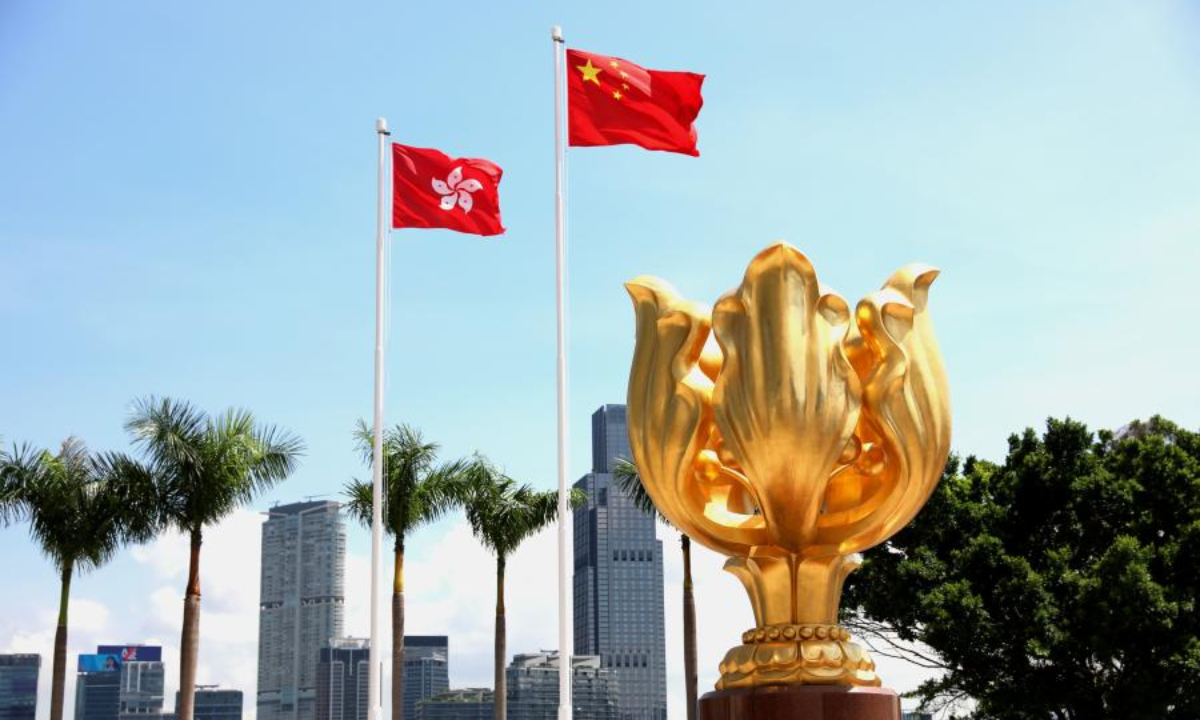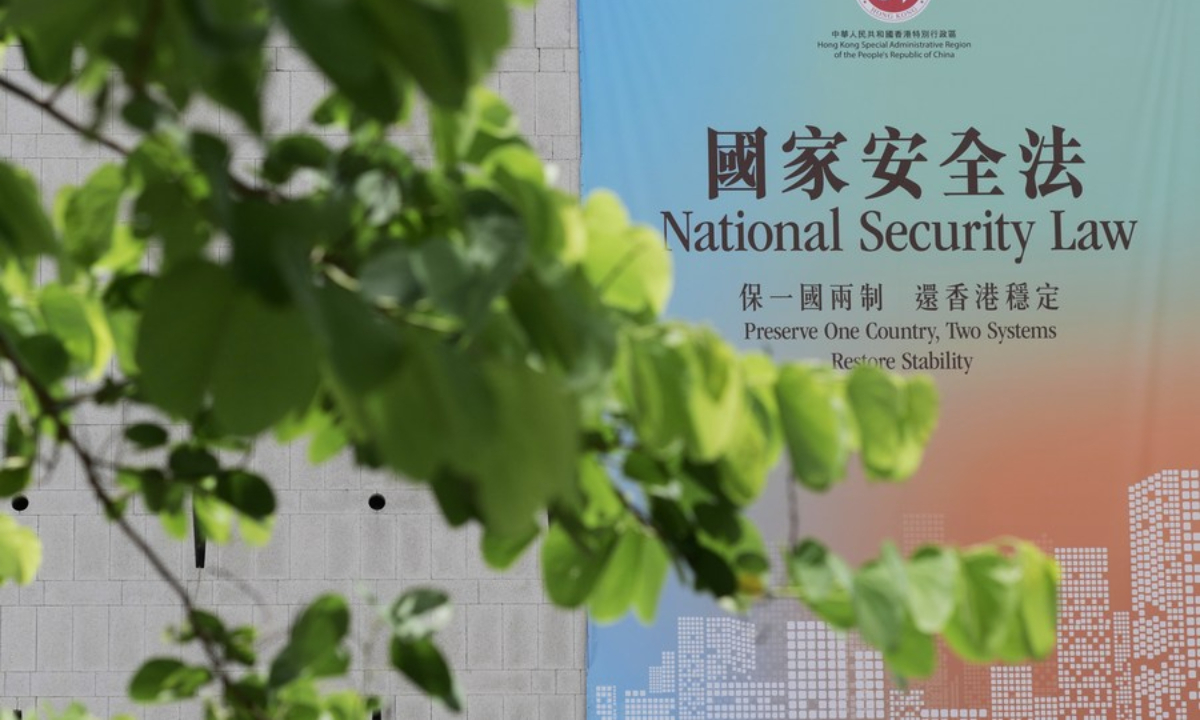
Photo taken on July 14, 2020 shows the Golden Bauhinia Square in south China's Hong Kong. Photo:Xinhua
China's top legislature adopted an interpretation of Article 14 and Article 47 on the Law of the People's Republic of China on Safeguarding National Security in the Hong Kong Special Administrative Region (HKSAR) on Friday, which aims to properly handle the issues encountered in practicing the national security law (NSL) for Hong Kong and effectively safeguard the country's sovereignty, security and development interests.
The interpretation was adopted at the 38th session of the 13th National People's Congress (NPC) where lawmakers deliberated a State Council proposal for giving the interpretation. The proposal was submitted to respond to a report by the HKSAR Chief Executive (CE) to the central government after infamous secessionist media tycoon Jimmy Lai tried to hire a London-based barrister to defend his case.
Legal officials and experts consider the law interpretation necessary, reasonable and feasible to ensure the correct practice of the NSL for Hong Kong, fixing the current legal disputes in implementing the law and plugging the loopholes in the city's legal system.
Article 14 of the NSL for Hong Kong stipulates that the duties and functions of the Committee for Safeguarding National Security of the HKSAR include analyzing and assessing developments in relation to safeguarding national security in the HKSAR, making work plans, and formulating policies for safeguarding national security in the city, advancing the development of the legal system and enforcement mechanisms of the region for safeguarding national security and coordinating major work and significant operations to safeguard national security.
No institution, organization or individual in the region shall interfere with the work of the committee. Information relating to the work of the committee shall not be subject to disclosure. Decisions made by the committee shall not be amenable to judicial review.
The courts of the HKSAR shall obtain a certificate from the CE to certify whether an act involves national security or whether the relevant evidence involves state secrets when such questions arise in the adjudication of a case. The certificate shall be binding on the courts, according to the Article 47 of the NSL for Hong Kong.
The proposal made by John Lee, CE of the HKSAR, on November 28 concerning the overseas lawyers without full qualifications for practicing in the HKSAR would trigger national security risks. The matter falls under Article 47, which requires a certificate issued by the CE.
If Hong Kong courts do not obtain a certificate from the CE, the committee shall perform its duties and take decisions on the relevant situation and questions in accordance to the Article 14, according to the NPC.
Lee submitted a report to the central government mentioning the case of Lai in late November suggesting that the NPC Standing Committee should interpret the NSL for Hong Kong to clarify whether a lawyer without local full qualifications can handle national security cases after the city's top court rejected an appeal by the Department of Justice to overturn the permission to allow London-based King's Counsel Timothy Owen to represent Lai, which is seen as a disappointing ruling.

Photo taken on June 29, 2020 shows a billboard on the Law of the People's Republic of China on Safeguarding National Security in the Hong Kong Special Administrative Region (HKSAR) in Central area in Hong Kong, south China. Photo:Xinhua
An official from the Legislative Affairs Commission of the Standing Committee of the NPC said the law interpretation came as Hong Kong society faces huge divergence in practicing the NSL for Hong Kong. It is necessary to ensure the correct and effective implementation of the NSL for Hong Kong and effectively safeguard the constitutional order of HKSAR established by the Constitution and the Basic Law, the official said.
Since the city's return to the motherland, Hong Kong has seen six instances of law interpretations from China's top legislature, including the latest one on Friday,, according to media reports.
Article 65 of the NSL for Hong Kong also stipulates that the power of interpretation shall be vested in the Standing Committee of the NPC.
The NPC Standing Committee has interpreted the Basic Law for five times, forming a relatively mature law interpretation experience and practice, which has been familiar to all sectors of Hong Kong society and has been generally recognized, the official said.
The law interpretation is to solve legal problems that are difficult to solve at the level of the HKSAR, clearing off the confusion and ending the conflicts, which serves to "set the tone," the official said, noting that the law interpretation has become a major part of the SAR's legal system.
"The NPC's law interpretation actually allows the Committee for Safeguarding National Security of the HKSAR to take the ultimate responsibility in Hong Kong to ensure that the lawyers involved in the trial of national security cases are people who can loyally safeguard national security and keep state secrets," Lau Siu-kai, a consultant from the Chinese Association of Hong Kong and Macao Studies who is also a senior policy advisor, told the Global Times on Friday.
The law interpretation once again shows that the central government actively exercised its overall governance to fully and accurately implement the One Country, Two Systems principle, Lau added.
The Constitution and the Basic Law together constitute the constitutional basis of the HKSAR.
The Standing Committee of the NPC does not directly deal with specific judicial cases, which is different from judicial interpretations made by judicial organs in the trial of specific cases, the official said. The law interpretation by the top legislature is conducive to clarifying the meaning of the relevant legal provisions, properly solving major disputes encountered in the implementation of the NSL for Hong Kong and playing a positive role for Hong Kong residents to choose lawyers and for the HKSAR to correctly exercise independent judicial power and power of final adjudication.
"There is no undermining of the high degree of the autonomy of the HKSAR," the official said.
Local authorities in Hong Kong welcomed the latest move. Hong Kong's judiciary said on Friday night that it respects the lawful exercise of power by the Standing Committee of the NPC to make legally binding interpretations of Articles 14 and 47 of the NSL regarding the HKSAR's performance of its duties in safeguarding national security.
The judiciary will, as required by Article 3 of the NSL for Hong Kong, continue to effectively prevent, suppress and impose punishment for any act or activity endangering national security in accordance with law, according to a statement.
Lee also thanked and welcomed the matter, saying that the Committee and the HKSAR government will fully assume the responsibilities explained in the law interpretation, especially on whether hiring a foreign lawyer for a national security case will involve national security risks.
The HKSAR government will implement the judgments and decisions made by the Committee on relevant issues, and actively consider proposing amendments to the Legal Practitioners Ordinance, Lee said.
"Lai's case involved colluding with external forces, engaging in anti-China activities and disrupting order in Hong Kong, which seriously threatens national security and allowing him to hire a foreign lawyer is very inappropriate," Louis Chen, member of the Election Committee and general secretary of the Hong Kong Legal Exchange Foundation, told the Global Times on Friday.
The recent legal disputes showed that some people in Hong Kong's legal and judicial sectors still do not fully understand and lack compliance with the relevant provisions of the Basic Law. The law interpretation effectively plugged the loopholes of the legal system, echoing the expectations of Hong Kong society, Chen noted.
"As the chairperson of the committee, the CE should be deeply involved in the implementation of national security law and the interpretation puts forward the concept of the certification from the CE, confirming the CE's responsibilities in implementing the NSL for Hong Kong," he said.
Foreign lawyers are welcomed to take part in cases not involving endangering national security, and no matter how amendments to be made, they won't affect foreign lawyers who obtain specific permissions approved by local courts in taking part in non-national security cases in the future, Lee told reporters on Friday evening, stressing that the law interpretation this time targets specific scope.





